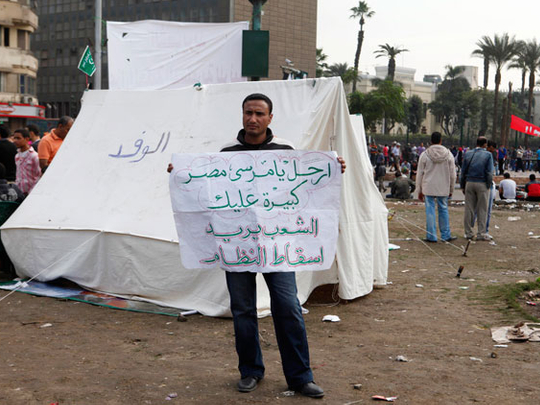
Cairo: Youths clashed with police in Cairo on Saturday as protests at new powers assumed by President Mohammad Mursi stretched into a second day, confronting Egypt with a crisis that has exposed the split between newly empowered Islamists and their opponents.
A handful of hardcore activists hurling rocks battled riot police in the streets near Tahrir Square, where several thousand protesters massed on Friday to demonstrate against a decree that has rallied opposition ranks against Mursi.
Following a day of violence in Cairo, Alexandria, Port Said and Suez, the smell of teargas hung over the square, the heart of the uprising that swept Hosni Mubarak from power in February 2011.
More than 300 people were injured on Friday. Offices of the Muslim Brotherhood, which propelled Mursi to power, were attacked in at least three cities.
Egypt’s highest judicial authority said the decree marked an “unprecedented attack” on the independence of the judiciary, the state news agency reported.
Leftist, liberal and socialist parties have called for an open-ended sit-in with the aim of “toppling” the decree, which has also drawn statements of concern from the United States and the European Union. A few dozen activists manning makeshift barricades kept traffic out of the square on Saturday.
Calling the decree “fascist and despotic”, Mursi’s critics called for a big protest on Tuesday against a move they say has revealed the autocratic impulses of a man jailed by Mubarak, who outlawed Mursi’s Muslim Brotherhood.
“We are facing a historic moment in which we either complete our revolution or we abandon it to become prey for a group that has put its narrow party interests above the national interest,” the liberal Dustour Party said in a statement.
Issued late on Thursday, the decree marks an effort by the Mursi administration to consolidate its influence after it successfully sidelined Mubarak-era generals in August.
The decree reflects the Muslim Brotherhood’s suspicion towards sections of a judiciary unreformed from Mubarak’s days: it guards from judicial review decisions taken by Mursi until a new parliament is elected in a vote expected early next year.
It also shields the assembly writing Egypt’s new constitution from a raft of legal challenges that have threatened the Islamist-dominated assembly with dissolution.
The Mursi administration has defended the decree on the grounds that it aims to speed up a protracted transition from Mubarak’s rule to a new system of democratic government.
At an emergency meeting called to discuss the decree, the Supreme Judicial Council, Egypt’s highest judicial authority, urged “the president of the republic to distance this decree from everything that violates the judicial authority”.
‘Al Masry Al Youm’, one of Egypt’s most widely read dailies, hailed Friday’s protest as “The November 23 Intifada”, invoking the Arabic word for uprising, while US state department spokeswoman Victoria Nuland said: “The decisions and declarations announced on November 22 raise concerns for many Egyptians and for the international community.
The European Union urged Mursi to respect the democratic process, while the United Nations expressed fears about human rights.
However, ‘Freedom and Justice’, the newspaper run by the Brotherhood’s political party, claimed that “the people support the president’s decisions.”












